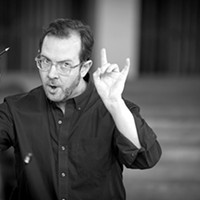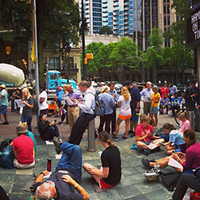In the United States and Canada, proms are strictly high school. But in Britain, the Proms are an annual celebration at the Royal Albert Hall with 58 consecutive nights of classical music concerts produced by the BBC. At ground level facing the stage above, hundreds of music lovers throng into a commons area, standing throughout the evening, squatting sometimes on the ground, or sitting in portable chairs they have carried in with them. Dirt-cheap ticket prices make the ordeal worthwhile.
Thousands more sit in conventional concert hall seats surrounding the stage. The set-up is a fascinating echo of what we know about how Shakespeare's plays were first presented outdoors at the Globe Theatre -- except that the "promenaders" without proper seats were called groundlings during the Elizabethan Age.
Now there's an irresistible chunk of promenade style at Davidson College, as the 2007 Royal Shakespeare Company Residency continues through Sunday. Nearly the entire orchestra area of Duke Family Performance Hall has been covered with flooring for intrepid promenaders willing to forswear comfy theater seating for three hours.
A long, lordly ramp runs up from the floor to the balcony, and two trestles on either side of the stage -- also connecting to the balcony -- complete an elegant circuit. So the RSC actors not only mingle almost constantly with the promenade ticket holders on the floor, they pass frequently among the folk in the balcony.
That makes RSC's two Shakespearean offerings, The Winter's Tale and Pericles, tremendously involving, whether you choose to promenade or you wimp out for conventional seating. The rains that poured down on Antigonus, before he was eaten by the Bard's infamous bear, came closer to the audience up in the center balcony than to any of us who were huddled at the ramp.
As you've already gathered from my brief description, these are not hastily slapped-together touring productions. Nor is RSC's technical expertise lavished upon mummified approximations of what those groundlings and nobler Elizabethans saw at the Globe. These reimagined late romances from the master's pen -- with their long-arcing, what-goes-around-comes-around storylines -- have as much to teach civilians as collegians.
We actually have a teacher in Pericles, the grizzled Gower, who narrates us across the seas and the years on the wings of poesy. In the RSC version, nearly all of the major characters are of African descent, and our narrator/poet is griot-ized, wielding a gnarled staff and sporting richly embroidered tribal robes.
Geography is likewise flip-flopped. Pentapolis, the only African locale among the five places where the seaworthy Prince of Tyre lands during his epic travels, is the only white country he visits before his final pilgrimage to Ephesus. Yet Pericles remains recognizably Shakespearean, his bio seasoned with obvious connections to the trials faced by Bassanio in love and Lear in royal intrigue.
We do get one very delightful Mediterranean interlude from director Dominic Cooke and fight choreographer Terry King during our sojourn in Pentapolis. Pericles and five nerdy knights, all vying for the favor of Princess Thaisa, engage in a comical Olympics, including fencing, a sprint and an unforgettable swim meet.
At the sweet heart of this ingratiating epic is Lucian Msamati's unwavering integrity and fortitude as Pericles, but the aura of Joseph Mydell's sagely Gower makes all the far-flung pieces of the tale cohere, ennobling it all. Kate Fleetwood and Ony Uhiara are chaste luminosities as Thaisa and her royal daughter Marina, casting a mournful light on the lusts and deeds of men. Among the rest, I'd single out the rich voice of Ben Onwukwe as Helicanus, the trustworthy lord who serves as Pericles' regent in his absence.
For anyone who has never experienced it before, Pericles is obviously the jewel of rare price at the 2007 Residency. But I would still commend The Winter's Tale -- more resolutely transposed to modern times -- as among the best Shakespearean productions I've seen anywhere.
Cooke renders the scenes in Sicilia, plunged into misery by King Leontes' mad jealousy, with the unsparing darkness we associate with the Bard's finest tragedies. Quite a plunge when you consider that we begin at a swank New Year's Eve soiree at the joyous stroke of midnight.
We get an equally audacious transition when we follow Leontes' renounced daughter, Perdita, to Bohemia. The babe's rescuer is still being torn limb from limb by that Bear -- rendered as darkly as everything that has come before -- when the tone instantly turns comical. Cooke also chooses his modern eras judiciously when leaping across the 16-year span between the day Perdita is discovered by the young Bohemian shepherd and the afternoon when she is betrothed to Bohemia's future king, Prince Florizel.
Leontes' suspicions are enflamed during the paranoid Red Scare 50s, so we end when peace is enfolding the planet in the psychedelic flower-power days of Woodstock. Or as sound designer Carolyn Downing would have it, when the Mamas and the Papas have supplanted Perry Como.
I do wish Cooke & Co. had stressed these eras more pointedly, particularly when Leontes intimidates and self-destructs. Obliquely, we tap the possibilities when Queen Hermione is put on trial and judged by her King, who is deaf to all evidence, eloquence and even Apollo's oracles. The staging reminded me somehow of the Salem witch trials. That, of course, was the essence of Arthur Miller's response to McCarthyism in The Crucible.
Fleetwood is again superb as the wrongly accused Hermione, both at the trial and the final scene that sadly echoes it, so many years and sufferings later. The bittersweet joy one feels at this point is also a credit to Anton Lesser, whose performance reaches its highest level as the chastened, penitent Leontes -- and the simple sweetness of Michelle Terry as Perdita.
At the comic end of the spectrum, Richard Katz as Autolycus and Richard Moore as the Old Shepherd are the main fonts of hilarity.
The 2007 Residency is the RSC's best yet, ranging from the sublime of Fleetwood's amazing cameo as the goddess Diana in Pericles to Katz's ridiculous Dylanesque rendition of "The Doxy in the Dale" in The Winter's Tale. Get into it if you can, promenade style.
Maestro Christof Perick conducted his second consecutive Classics Series concert program last week -- establishing a new season high -- as the Charlotte Symphony Orchestra sought to rebound from its defeat in the Brahms smackdown vs. the BBC National of Wales. This time around, we were witnessing a Beethoven smackdown as the home team performed Ludwig's Pastoral Symphony #6 and violinist Joshua Bell countered with the Violin Sonata #10, both in sunny major keys.
This time, CSO clearly held its own. As the Pastoral unfolded, lighter and airier at the outset than any interpretation I can recall -- yet still coherent and convincing -- I began to suspect that Perick had stolen time from rehearsals of the previous week's all-Brahms lineup to add extra luster to this Beethoven. Erica Cice subbed capably in the principal oboe chair, intermingling effectively with principal flutist Elizabeth Landon in the brook scene.
The French horns had a better night after sitting out the concert opener, Schoenberg's Verklarte Nacht. All the chirruping quips from the winds in the final Pastoral episode flitted in and out flawlessly, never sounding choppy, and the earthy song from the strings had a newly cultivated richness. The new placement of celli and double basses, upstage from the first violins, is paying off.
Bell was hugely outnumbered, accompanied only by the versatile Jeremy Denk at the keyboard. The Grammy Award-winning violinist's ethereal tone and soulful vibrato were actually better attuned to the Beethoven than the Schumann that preceded. As for the Edgar Meyer Concert Piece, I found the usual inconsistencies that I've encountered in this personable composer's work before. Fascinating modernist explorations of Bartokian excitement, punctuated -- and cheapened -- by mountain noodlings and minimalist monotony.
When you can hum the next 16 bars before you've heard them, something is amiss. Fortunately, Bell's selections from his new Voice of the Violin CD held no more crossover abortions. In fact, Sarasate's "Introduction and Tarantella" allowed Bell to finish with exactly the kind of bravura his discriminating fans love best.
Space doesn't permit me to extol all the intricacies and virtues of Lynn Nottage's Intimate Apparel, at Actor's Theatre through Feb. 23. Kim Watson Brooks and Sidney Horton make a fascinating couple, dogged by poverty and mutual deceit, while Tanya McClellan and Joseph Klosek offer able support.
Even more remarkable perhaps is Noah Haidle's high energy satiric fantasy, Mr. Marmalade, now at Spirit Square through Feb. 24. Gotham critics savaged the piece last year, effectively dissuading me from seeing the Broadway version. After seeing the BareBones Theatre Group edition, directed by James Yost, I'm left wondering whether it was the press or the original director who missed Haidle's brilliance.
With over-the-top regression from Beth Yost, melodramatic excess from Robert Lee Simmons and Robert Haulbrook's signature servility, there are no subtleties here. Just abundant delights.
Speaking of 2.33000
-
Blotter
Oct 3, 2007 -

A Culture of Hate
Sep 19, 2007 -

Check it out
Apr 25, 2007 - More »
Latest in Performing Arts
More by Perry Tannenbaum
Calendar
-
Derek Hough - Symphony Of Dance @ Ovens Auditorium
-

NEW WINDOW GALLERY-Pat Rhea-ACRYLIC PAINTINGS-April 05-30 2024 VALDESE, NC 28690 @ New Window Gallery/Play It Again Records
- Through April 30, 12 p.m.
-

"Blood Residue Analysis of Paleoamerican Stone Tools in the Carolinas" @ Native American Studies Center
- Fri., April 26, 12-1 p.m.
-

ARTS RENAISSANCE, a GALA supporting the ARTS in South Carolina @ the Columbia Museum of ART
-
 The Piano Guys @ Ovens Auditorium
The Piano Guys @ Ovens Auditorium
-
The death of CAST 5
What really happened to Charlotte's beloved experimental theater company?
-
Jessica Moss Makes the Gantt Center a Safe Zone for Local Artists 2
Flipping the script
-
Charlotte ink 7
Behind the pain with a trio of the Queen City's finest tattoo artists














